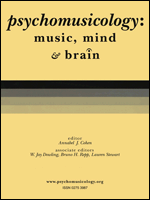 “Ever-changing Cycles of Musical Pleasure: The role of anticipation and dopamine”
“Ever-changing Cycles of Musical Pleasure: The role of anticipation and dopamine”
Gebauer, L., Kringelbach, M. L. & Vuust, P
Abstract:
Music listening is highly pleasurable and important part of most people’s lives. Because music has no obvious importance for survival, the ubiquity of music remains puzzling and the brain processes underlying this attraction to music are not well understood. Like other rewards (such as food, sex, and money), pleasurable music activates structures in the dopaminergic reward system, but how music manages to tap into the brain’s reward system is less clear. Here we propose a novel framework for understanding musical pleasure, suggesting that music conforms to the recent concept of pleasure cycles with phases of “wanting/expectation,” “liking,” and “learning.” We argue that expectation is fundamental to musical pleasure, and that music can be experienced as pleasurable both when it fulfills and violates expectations. Dopaminergic neurons in the midbrain represent expectations and violations of expectations (prediction errors) in response to “rewards” and “alert/incentive salience signals.” We argue that the human brain treats music as an alert/incentive salience signal, and suggest that the activity of dopamine neurons represents aspects of the phases of musical expectation and musical learning, but not directly the phase of music liking. Finally, we propose a computational model for understanding musical anticipation and pleasure operationalized through the recent theory of predictive coding.